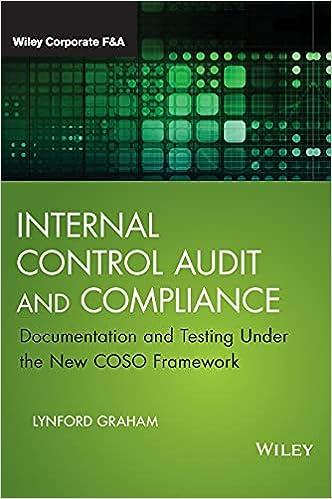Question
Genuine Spice Inc. began operations on January 1 of the current year. The company produces 8-ounce bottles of hand and body lotion called Eternal Beauty.
Genuine Spice Inc. began operations on January 1 of the current year. The company produces 8-ounce bottles of hand and body lotion called Eternal Beauty. The lotion is sold wholesale in 12-bottle cases for $100 per case. There is a selling commission of $20 per case. The January direct materials, direct labor, and factory overhead costs are as follows:
DIRECT MATERIALSCost BehaviorUnits per CaseCost per UnitCost per CaseCreambaseVariable100 ozs.$0.02$2.00NaturaloilsVariable30 ozs.0.309.00Bottle(8-oz.)Variable12 bottles0.506.00$17.00DIRECT LABORDepartmentCost BehaviorTime per CaseLabor Rate per HourCost per CaseMixingVariable20 min.$18.00$6.00FillingVariable514.401.2025 min.$7.20FACTORY OVERHEADCost BehaviorTotal CostUtilitiesMixed$600Facility leaseFixed14,000EquipmentdepreciationFixed4,300SuppliesFixed660$19,560Part ABreak-Even Analysis
The management of Genuine Spice Inc. wishes to determine the number of cases required to break even per month. The utilities cost, which is part of factory overhead, is a mixed cost. The following information was gathered from the first six months of operation regarding this cost:
MonthCase ProductionUtility Total CostJanuary500$600February800660March1,200740April1,100720May950690June1,025705Required-Part A:1.Determine the fixedand variableportions of the utility cost using the high-lowmethod.2.Determine the contribution marginper case.3.Determine the fixed costs per month, including the utility fixed cost from part (1).4.Determine the break-even number of cases per month.Part BAugust Budgets
During July of the current year, the management of Genuine Spice Inc. asked the controller to prepare August manufacturing and income statement budgets. Demand was expected to be 1,500 cases at $100 per case for August. Inventory planning information is provided as follows:
Finished Goods Inventory:
CasesCostEstimatedfinishedgoodsinventory,August1300$12,000Desired finished goods inventory, August 311757,000Materials Inventory:
Cream BaseOilsBottles(ozs.)(ozs.)(bottles)Estimatedmaterialsinventory,August1250290600Desiredmaterialsinventory,August311,000360240There was negligible work in process inventory assumed for either the beginning or end of the month; thus, none was assumed. In addition, there was no change in the cost per unit or estimated units per case operating data from January.
Required-Part B:5.Prepare the August production budget.6.Prepare the August direct materials purchases budget.7.Prepare the August direct labor budget.8.Prepare the August factory overhead budget.9.Prepare the August budgeted income statement, including selling expenses.Part CAugust Variance Analysis
During September of the current year, the controller was asked to perform variance analyses for August. The January operating data provided the standard prices, rates, times, and quantities per case. There were 1,500 actual cases produced during August, which was 250 more cases than planned at the beginning of the month. Actual data for August were as follows:
Actual Direct MaterialsPrice per UnitQuantity per CaseCreambase$0.016 per oz.102 ozs.Naturaloils$0.32 per oz.31 ozs.Bottle(8-oz.)$0.42 per bottle12.5 bottlesActual DirectActual Direct LaborLabor RateTime per CaseMixing$18.2019.50 min.Filling14.005.60 min.Actual variable overhead$305.00Normal volume1,600 casesThe prices of the materials were different than standard due to fluctuations in market prices. The standard quantity of materials used per case was an ideal standard. The Mixing Department used a higher grade labor classification during the month, thus causing the actual labor rate to exceed standard. The Filling Department used a lower grade labor classification during the month, thus causing the actual labor rate to be less than standard.
Required-Part C:10.Determine and interpret the direct materials price and quantity variances for the three materials.11.Determine and interpret the direct labor rate and time variances for the two departments.12.Determine and interpret the factory overhead controllable variance.13.Determine and interpret the factory overhead volume variance.14.Why are the standard direct labor and direct materials costs in the calculations for parts (10) and (11) based on the actual 1,500-case production volume rather than the planned 1,375 cases of production used in the budgets for parts (6) and (7)?




 \begin{tabular}{|l|l|l|l|l|} \hline \multicolumn{2}{|c|}{ Direct Labor Time Variance } \\ \hline & Mixing Department & & \\ \hline & & & & \\ \hline \end{tabular} 10. Determine and interpret the direct materials price and quantity variances for the three materials. e factory overhead controllable variance was caused by the variance in Additional instructions 11. Determine and interpret the direct labor rate and time variances for the two departments. \begin{tabular}{|l|l|l|l|l|} \hline \multicolumn{2}{|c|}{ Direct Labor Time Variance } \\ \hline & Mixing Department & & \\ \hline & & & & \\ \hline \end{tabular} 10. Determine and interpret the direct materials price and quantity variances for the three materials. e factory overhead controllable variance was caused by the variance in Additional instructions 11. Determine and interpret the direct labor rate and time variances for the two departments
\begin{tabular}{|l|l|l|l|l|} \hline \multicolumn{2}{|c|}{ Direct Labor Time Variance } \\ \hline & Mixing Department & & \\ \hline & & & & \\ \hline \end{tabular} 10. Determine and interpret the direct materials price and quantity variances for the three materials. e factory overhead controllable variance was caused by the variance in Additional instructions 11. Determine and interpret the direct labor rate and time variances for the two departments. \begin{tabular}{|l|l|l|l|l|} \hline \multicolumn{2}{|c|}{ Direct Labor Time Variance } \\ \hline & Mixing Department & & \\ \hline & & & & \\ \hline \end{tabular} 10. Determine and interpret the direct materials price and quantity variances for the three materials. e factory overhead controllable variance was caused by the variance in Additional instructions 11. Determine and interpret the direct labor rate and time variances for the two departments Step by Step Solution
There are 3 Steps involved in it
Step: 1

Get Instant Access to Expert-Tailored Solutions
See step-by-step solutions with expert insights and AI powered tools for academic success
Step: 2

Step: 3

Ace Your Homework with AI
Get the answers you need in no time with our AI-driven, step-by-step assistance
Get Started


